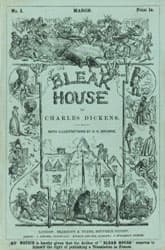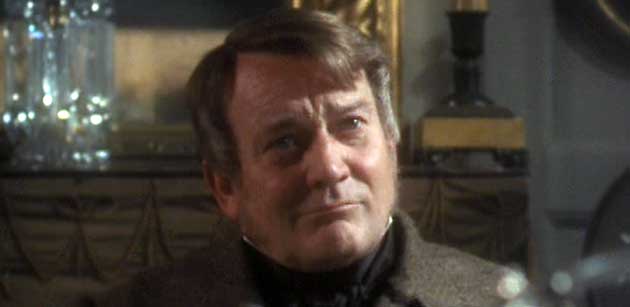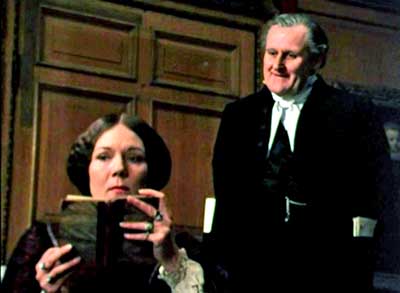Bleak House
Critique • Quotes • Text • At the movies
 First serial, 1852
First serial, 1852First publication
1852–1853 as twenty-part serial with illustrations by Phiz
Publication in book form
1853
Literature form
Novel
Genres
Literary, crime, mystery
Writing language
English
Author's country
England
Length
Approx. 166,000 words

Denholm Elliott is Mr. Jarndyce, the moral centre of 1985's television serial of Dickens's Bleak House.
Finding the humanity in the bleak masterpiece
Bleak House (1985): Television miniseries, seven hours; director Ross Devenish; writer Arthur Hopcraft; featuring Diana Rigg, Denholm Elliott, Peter Vaughan, Suzanne Burden, T.P. McKenna, Philip Franks, Lucy Hornak, Ian Hogg, Robin Bailey, Brian Deacon, Chris Pitt
As great as the novel is, the stage, radio, film and video adaptations of Bleak House all improve on it in one respect.
To fit the story into the few hours they have available, script writers cut the number of characters and subplots that lose readers in the notoriously dense book. They streamline the main story to get past all the niggling non-developments in the dull and dusty Jarndyce-versus-Jarndyce court case that drags throughout the novel and they focus on the more dramatic and emotional scenes involving some of the more fully realized central figures.
As he cranked out the initial instalments of Bleak House for serial publication, Charles Dickens spilled an excess of ink in a meandering search for a spine of a story to bear his characters forward. But filmmakers, knowing how the story eventually crystallizes, can make their way to it in a straighter line.
Over the past century and half, about a dozen adaptations have been produced, focusing on just parts of Bleak House. The full narrative is so long and, especially in the sections that follow the court case, purposely tedious. A couple of early adaptations depicted only the short, sad life of Jo the street sweeper.
In recent decades however, the BBC has taken advantage of the longer runtimes of television and radio serialization to convey larger chunks of the narrative and flesh out the novel's many major characters in multi-episode productions.
The miserable poor and rich
The series with the widest impact in the twentieth century was probably the 1985 television dramatization.
It's also still stands as one of the darkest adaptations of Bleak House. The first scenes of orphans Esther, Ada and Richard arriving in London of the 1800s paint a dank and dreary picture of life in the city. We're also introduced early to the most pathetic portrayal of homeless Jo to be seen on screen. The despairing life of the common people of the time is a theme recurring through the series.
The contradiction between privileged and impoverished lives is played up repeatedly. In one of the sharpest contrasts, Harold Skimpole (T.P. McKenna), who sponges off his wealthy friends, is shown declaring he's a "child myself" as he selects from pastries in a wealthy parlour—just before the scene cuts to an actual child, the malnourished Jo near the end of his miserable existence.
This human misery is contrasted with the life of the rich as our three youngsters are taken in by their kindly guardian Mr. Jarndyce (Denholm Elliot) in his mansion named Bleak House. Even grander is Chesney Wold, the nearby estate of the cranky baronet Sir Leicester Dedlock (Robin Bailey) and his very proper wife Honoria (Diana Rigg), whose fates are mysteriously entangled with the Jarndyce household.
The picture of lower-class misery reaches a peak with Jo's pitiful death—in the novel giving Dickens a chance to let fly with his angriest outcry:
Dead, your Majesty. Dead, my lords and gentlemen. Dead, right reverends and wrong reverends of every order. Dead, men and women, born with heavenly compassion in your hearts. And dying thus around us every day.
Here the sentiment is presented directly to the camera by Mr. Jarndyce.
But all is not light and gaiety in the homes of the privileged either. The story of Lady Dedlock is brought to the fore as she is persecuted by lawyer Tulkinghorn (Peter Vaughan), who investigates her past and threatens to bring her scandal to her husband. Tulkinghorn meets a quick untimely end but the lady's drawn-out downfall and demise, as acted by Rigg, is surprisingly moving. One is even moved by the agony of Sir Leicester as he faces his own end with forgiveness for his wife on his lips.
Trailer for BBC series of Charles Dickens's Bleak House in 1985.
After Jo's and Lady Dedlock's stories conclude, the remaining episodes of the series seem anti-climactic. They return to resolving the court case and the relations of the Bleak House inhabitants.
The seven-hour length lets the series also cover several of the novel's myriad subplots and minor characters, though even that running time requires several others to be cut entirely. Not to be missed though.
Over all, this is a fair representation of Dickens's novel condensed sensitively for popular modern media. The production, however, has that slightly stagy Masterpiece Theatre feel to it. But this does not detract from its unflinchingly dark, atmospheric depiction of the world of Bleak House.
— Eric
Critique • Quotes • Text • At the movies
1985, 2005


